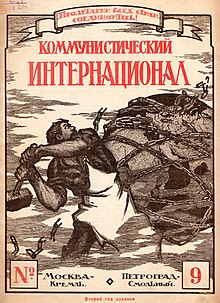
Back الشيوعية الدولية Arabic الكومنترن ARZ Tercer Internacional AST Коммунистик интернационал Bashkir Камуністычны інтэрнацыянал Byelorussian Камуністычны інтэрнацыянал BE-X-OLD Комунистически интернационал Bulgarian Komintern Breton III Internacional Catalan Kominterna Czech
Communist International | |
|---|---|
 | |
| General Secretary | Georgi Dimitrov |
| Founders | |
| Founded | 2 March 1919 |
| Dissolved | 15 May 1943 |
| Preceded by | |
| Succeeded by | Cominform |
| Newspaper | Communist International |
| Youth wing | Young Communist International |
| Ideology |
|
| Political position | Far-left |
| Anthem | Kominternlied/Гимн Коминтерна |
| Part of a series on |
| Communism |
|---|
 |
|
|

| Part of a series on |
| Leninism |
|---|
 |
| Part of a series on |
| Marxism–Leninism |
|---|
 |
The Communist International (Comintern), also known as the Third International, was an international organization founded in 1919 that advocated world communism, and which was led and controlled by the Communist Party of the Soviet Union.[3][4][5] The Comintern resolved at its Second Congress in 1920 to "struggle by all available means, including armed force, for the overthrow of the international bourgeoisie and the creation of an international soviet republic as a transition stage to the complete abolition of the state".[6] The Comintern was preceded by the dissolution of the Second International in 1916. Vladimir Lenin, Leon Trotsky, and Joseph Stalin were all honorary presidents of the Communist International.[7]
The Comintern held seven World Congresses in Moscow between 1919 and 1935. During that period, it also conducted thirteen Enlarged Plenums of its governing Executive Committee, which had much the same function as the somewhat larger and more grandiose Congresses. Joseph Stalin, leader of the Soviet Union, dissolved the Comintern in 1943 to avoid antagonizing his allies in the later years of World War II, the United States and the United Kingdom. It was succeeded by the Cominform in 1947.
- ^ Blanc, Paul Le (15 April 2015). Leon Trotsky. Reaktion Books. pp. 1–224. ISBN 978-1-78023-471-7.
- ^ Allen, Barbara (8 January 2015). Alexander Shlyapnikov, 1885–1937: Life of an Old Bolshevik. BRILL. p. 233. ISBN 978-90-04-24854-0.
- ^ Legvold, Robert (2007). Russian Foreign Policy in the Twenty-First Century and the Shadow of the Past. Columbia University Press. p. 408. ISBN 978-0-231-51217-6.
However, the USSR created an entirely new dimension of interwar European reality, one in which Russia devised rules of the game and set the agenda, namely, the Comintern.
- ^ Conquest, Robert (1990). The Great Terror: A Reassessment. Oxford University Press. p. 399. ISBN 978-0-19-507132-0.
It became instead a set of parties founded strictly on the Bolshevik model, and constitutionally subordinated to the Comintern - which always remained under effective Soviet control.
- ^ "Third International". Encyclopædia Britannica. Retrieved 3 December 2020.
Though its stated purpose was the promotion of world revolution, the Comintern functioned chiefly as an organ of Soviet control over the international communist movement.
- ^ Fisher, Harold Henry (1955). The Communist Revolution: An Outline of Strategy and Tactics. Stanford UP. p. 13.
- ^ Deutscher, Isaac (5 January 2015). The Prophet: The Life of Leon Trotsky. Verso Books. p. 605. ISBN 978-1-78168-721-5.